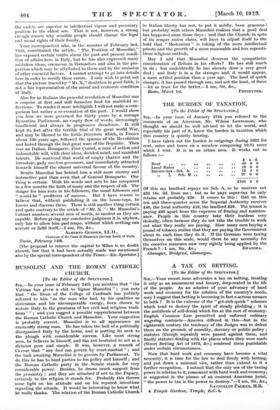A TAX ON BETTING. [To the Editor of the SPEcrAroa.1
Sui,—Your recent issue advocates a tax on betting, treating it only as an amusement and luxury, deep-seated in the life of the people. As an admirer of your advocacy of hard work and economy for the solution of the country's needs, may I suggest that betting is becoming in fact a serious menace to both ? It is the extreme of the " get-rich-quick " schemes which tend to destroy the spirit of steady plodding ; it is the antithesis of self-denial which lies at the root of economy. English Common Law permitted and enforced ordinary wagering contracts—America -differed in this—but in the eighteenth century the tendency of the Judges was to defeat them on the grounds of morality, decency or public policy ; statutes (though repealed) were passed against them, and finally statutes dealing with the places where they were made (Street Betting Act of 1878, &e.) rendered them punishable under certain circumstances.
Now that hard work and economy have become a vital necessity, it is time for the law to deal fhinly with betting, and put down a national vice, rather than extend to it a further recognition. I submit that the only use of the taxing. power in relation to it, consonant with hard work and economy, is suggested in the phrase of an eminent American jurist, "the power to tax is the power to destroy."—I am, Sir, &c., LAUNCELOT PAZIEgn, M.B.
4 Temple Gardens, Temple, E.C. 4.










































 Previous page
Previous page